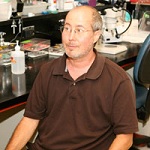Novartis Venture Fund has stepped in to take the lead on a $34 million venture round for Redwood City, CA-based upstart Annexon Bioscience, which believes it has the inside track on a new treatment for Huntington's disease.
 |
| Stanford's Ben Barres |
Annexon was founded three years ago by Stanford's Ben Barres and Arnon Rosenthal, the co-founder of Rinat and Alector. The two are pursuing an autoimmunity approach to neurodegenerative diseases, exploring the way that nerve connections are destroyed by a cascade of events. Their lead drug is ANX005, an antibody designed to halt that cascade.
"Annexon has what we believe to be a uniquely elegant approach to neurodegenerative and autoimmune diseases," said Dr. Campbell Murray of Novartis Venture Funds. "The important role of the classical complement cascade in antibody-mediated autoimmune disorders has been known for some time, and the discovery that it contributes to loss of nerve connections in neurodegenerative disease is highly innovative." Satter Investment Management and Clarus Ventures also participated in the round.
The biotech also has connections to Elan ($ELN), the Irish biotech that developed Tysabri for multiple sclerosis and failed spectacularly in Alzheimer's with bapineuzumab. CEO Doug Love had been in charge of alliances at Elan, and CSO Ted Yednock is credited as the scientific inventor of Tysabri.
The way Love explains it, the company was founded on insights Barres made into the way the immune system prunes "weak and dying synapses" at an early stage of life. That synaptic pruning mechanism can be turned back on later in life in the event of a brain trauma, and finding an antibody that can inhibit that process can be a key to protecting the brain's cognitive capacity in the event of the development of a neurodegenerative disease.
If they're right, the theory is that their approach could be complementary, for example, to the primary focus for Alzheimer's disease: amyloid beta. Early-stage Huntington's patients can be easily identified with a simple test for C1q levels, adds Love.
The biotech is a virtual player and plans to remain one indefinitely. Love says the team currently comprises two people, himself and the CSO. And while he's planning to flesh out a team that includes a number of consultants, Annexon will remain lean and mean with enough cash on hand to nail down early-stage efficacy for "multiple indications."
- here's the release